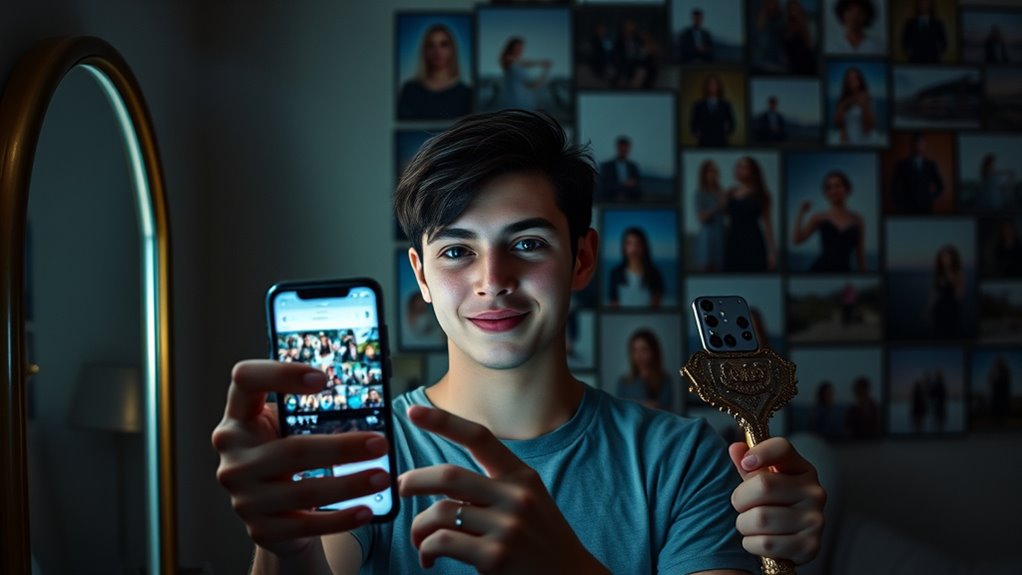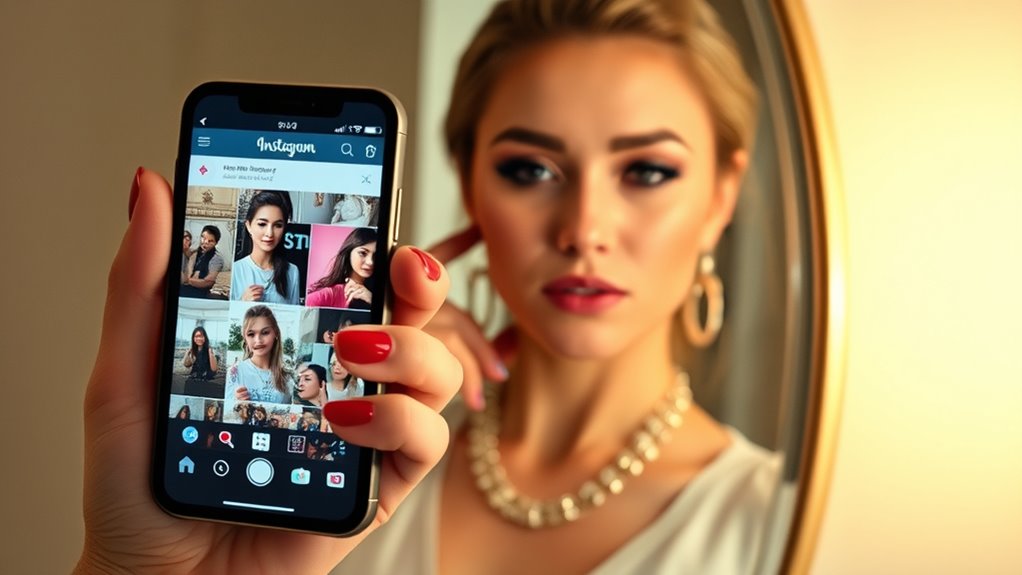On Instagram, creating perfect, curated images and seeking constant validation can reveal narcissistic traits. When you focus on projecting an ideal self-image, obsess over likes, and seek praise, you’re elevating superficial approval over genuine self-expression. These habits can distort your self-view and make your worth depend on online approval. If you keep exploring, you’ll discover how these behaviors shape perceptions and how to develop healthier social media habits.
Key Takeaways
- Curating perfect images to project an idealized self-image fosters narcissistic tendencies centered on appearance and validation.
- Seeking external validation through likes and comments reinforces self-worth based on social approval rather than authenticity.
- Obsessive checking of notifications and engagement metrics indicates a desire for constant admiration and reinforcement of self-image.
- Emphasizing popularity and online recognition can distort self-perception, prioritizing virtual approval over genuine self-awareness.
- Focusing on self-promotion and attention-seeking behaviors on Instagram aligns with narcissistic traits like self-centeredness and superficiality.

Have you ever wondered how some Instagram photos seem almost too perfect to be real? It’s like every shot is carefully curated, with just the right lighting, angles, and filters to create an image that’s almost too flawless to be genuine. You might not realize it, but these moments often reveal more about the person behind the camera than they intend. When you scroll through these images, what you’re really seeing is a form of self presentation designed to project a specific image to the world. People often craft their online personas to highlight their best features, achievements, or lifestyles, all in an effort to shape how others perceive them. This isn’t necessarily vanity; it can be a way to boost self-esteem or gain social status. But it’s also rooted in validation seeking. When you post a picture and wait for likes, comments, or shares, you’re effectively asking the world for approval. This craving for validation isn’t inherently bad, but it can become a habit that feeds narcissistic tendencies. The more positive reinforcement you get, the more you might rely on external validation to feel good about yourself, which can distort your self-image over time.
Instagram amplifies this behavior because it rewards perfection and popularity. Every like or comment becomes a small validation hit, reinforcing the need to keep presenting an idealized version of yourself. You might find yourself obsessively checking notifications, enthusiastic for that affirmation that confirms your worth. This cycle of validation seeking can lead to a preoccupation with maintaining an image that isn’t entirely authentic. Instead of expressing your real self, you might focus on showcasing only what garners admiration. It’s a subconscious effort to control how others see you, but it often results in a distorted sense of identity. You may start to believe that your value depends on external approval rather than genuine self-acceptance. Recognizing the importance of self-awareness can help mitigate these tendencies and foster a healthier approach to social media use.
This behavior can also feed narcissistic traits because it centers on making yourself the focus, often at the expense of authenticity. When your main goal becomes garnering admiration through perfect posts, you’re fundamentally turning social media into a stage for self-promotion. Over time, this can lead to a skewed sense of self, where your worth is tied to how many followers or likes you accumulate. Recognizing these habits is the first step toward building a healthier relationship with social media. Instead of purely seeking validation, try to focus on sharing your true self and valuing your intrinsic worth beyond online approval.
Frequently Asked Questions
How Can I Tell if Someone Is Secretly Narcissistic on Instagram?
If you’re wondering whether someone is secretly narcissistic on Instagram, look for signs like excessive self-promotion tactics and a validation obsession. They might constantly post selfies, seek out compliments, or prioritize likes and comments over genuine connections. Their content often revolves around showcasing their achievements or appearance, revealing a desire for admiration. These habits suggest they crave validation and may have underlying narcissistic traits, even if they don’t openly admit it.
Do All Narcissists Exhibit the Same Social Media Habits?
When wondering if all narcissists show similar social media habits, consider this: not everyone exhibits identical self-promotion tendencies or validation-seeking behaviors. Some may flaunt their lives, while others hide behind curated content. While many narcissists love attention, their online actions vary. You’ll notice differences in their posts, comments, and engagement styles. So, don’t assume all narcissists act alike—individual traits influence how they use social media to seek praise and portray perfection.
Can Instagram Habits Predict Real-Life Narcissistic Behavior?
You might wonder if your Instagram habits can predict real-life narcissistic behavior. While self-presentation strategies and seeking follower engagement can reflect confidence, they don’t always indicate narcissism. If you focus excessively on likes and comments or constantly curate your image, it could suggest narcissistic traits. However, it’s important to take into account the context and avoid jumping to conclusions based solely on social media behavior.
What Are the Signs of Low Self-Esteem Masked as Narcissism?
Did you know that some people with low self-esteem can display confidence signs that mimic narcissism? If you notice someone constantly seeking validation, overcompensating, or bragging excessively, it might be a mask for underlying self-esteem indicators. These behaviors often hide insecurities, making them appear as confidence signs. Recognizing this helps you understand that outward arrogance can sometimes be a cry for reassurance rather than true self-assurance.
How Can I Protect Myself From Narcissistic Individuals Online?
To protect yourself from narcissistic individuals online, set clear digital boundaries and stick to them. Use privacy settings to control who can see your posts and personal information, reducing their ability to manipulate or invade your space. Be cautious about sharing too much, and don’t hesitate to block or mute anyone who makes you uncomfortable. Prioritize your mental health and remember, safeguarding your online environment is essential.
Conclusion
By paying attention to your Instagram habits, you can see how your online behavior mirrors your inner self. Just like a mirror reflects your face, your social media use reveals hidden narcissistic tendencies. Recognizing these illusions helps you stay authentic and mindful. Remember, social media is like a spotlight—powerful but temporary. When you keep it in perspective, you’ll maintain a healthier balance between your online image and real-life authenticity.











